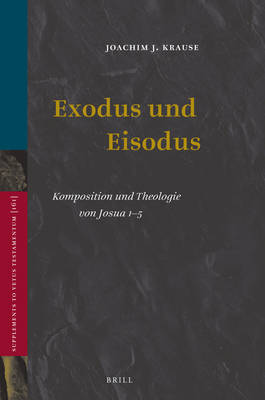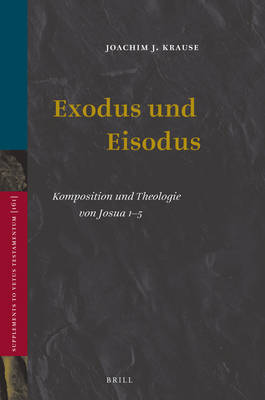
- Afhalen na 1 uur in een winkel met voorraad
- Gratis thuislevering in België vanaf € 30
- Ruim aanbod met 7 miljoen producten
- Afhalen na 1 uur in een winkel met voorraad
- Gratis thuislevering in België vanaf € 30
- Ruim aanbod met 7 miljoen producten
Zoeken
€ 265,95
+ 531 punten
Uitvoering
Omschrijving
For this book the author has received THE MANFRED LAUTENSCHLAEGER AWARD FOR THEOLOGICAL PROMISE 2015
Kein Auszug ohne Einzug - erst mit dem Eisodus in das verheißene Land kommt der Exodus aus Ägypten an sein Ziel. Es verwundert daher nicht, dass der erste Teil des Josuabuches in den Kapiteln 1-5, in dem dieser Einzug dargestellt wird, vielfältige literarische Bezüge zur Exodusüberlieferung im Pentateuch aufweist. Wie aber sind diese Bezüge zu erklären, als intratextuelle Bindeglieder ein und desselben Werkes oder als intertextuelle Bezugnahmen? Mit dem Aufweis einer sukzessiven Ausgestaltung der Ereignisse beim Eisodus nach dem Vorbild des Exodus bietet die vorliegende Untersuchung der Komposition und Theologie von Josua 1-5 in den drei überlieferten Ausgaben des Josuabuches (MT, LXX, Qumran) Antworten auf alte, angesichts der gegenwärtigen Debatte um Hexateuch und Deuteronomistisches Geschichtswerk hochaktuelle Fragen der Forschung.
_______________________________________________
The Exodus from Egypt is perfect only with the Eisodus into the Promised Land. It does not come as a surprise, therefore, that the first part of the Book of Joshua, which is dedicated to the entry into the land, features a variety of literary affinities to the Exodus tradition as found in the Pentateuch. But how are these affinities to be explained? Do they testify to an original literary work which covered both Exodus and Conquest, or do they rather betray subsequent connections through intertextual references? Analyzing the composition and theology of Joshua 1-5 in the three extant versions of the book (MT, LXX, Qumran), the present study contributes to the current debate of the Pentateuch, Hexateuch, and Deuteronomistic History.
Kein Auszug ohne Einzug - erst mit dem Eisodus in das verheißene Land kommt der Exodus aus Ägypten an sein Ziel. Es verwundert daher nicht, dass der erste Teil des Josuabuches in den Kapiteln 1-5, in dem dieser Einzug dargestellt wird, vielfältige literarische Bezüge zur Exodusüberlieferung im Pentateuch aufweist. Wie aber sind diese Bezüge zu erklären, als intratextuelle Bindeglieder ein und desselben Werkes oder als intertextuelle Bezugnahmen? Mit dem Aufweis einer sukzessiven Ausgestaltung der Ereignisse beim Eisodus nach dem Vorbild des Exodus bietet die vorliegende Untersuchung der Komposition und Theologie von Josua 1-5 in den drei überlieferten Ausgaben des Josuabuches (MT, LXX, Qumran) Antworten auf alte, angesichts der gegenwärtigen Debatte um Hexateuch und Deuteronomistisches Geschichtswerk hochaktuelle Fragen der Forschung.
_______________________________________________
The Exodus from Egypt is perfect only with the Eisodus into the Promised Land. It does not come as a surprise, therefore, that the first part of the Book of Joshua, which is dedicated to the entry into the land, features a variety of literary affinities to the Exodus tradition as found in the Pentateuch. But how are these affinities to be explained? Do they testify to an original literary work which covered both Exodus and Conquest, or do they rather betray subsequent connections through intertextual references? Analyzing the composition and theology of Joshua 1-5 in the three extant versions of the book (MT, LXX, Qumran), the present study contributes to the current debate of the Pentateuch, Hexateuch, and Deuteronomistic History.
Specificaties
Betrokkenen
- Auteur(s):
- Uitgeverij:
Inhoud
- Aantal bladzijden:
- 508
- Taal:
- Duits
- Reeks:
- Reeksnummer:
- nr. 161
Eigenschappen
- Productcode (EAN):
- 9789004267787
- Verschijningsdatum:
- 14/04/2014
- Uitvoering:
- Hardcover
- Formaat:
- Genaaid
- Afmetingen:
- 165 mm x 241 mm
- Gewicht:
- 929 g

Alleen bij Standaard Boekhandel
+ 531 punten op je klantenkaart van Standaard Boekhandel
Beoordelingen
We publiceren alleen reviews die voldoen aan de voorwaarden voor reviews. Bekijk onze voorwaarden voor reviews.











